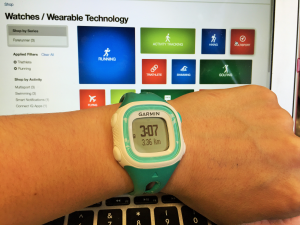Posted on October 06, 2016 by Kate Halsall
Has anyone this week sat on their high horse and told you with glee that your fitness tracker was a waste of money as they’ve been allegedly proven to not provide health benefits? Well let’s sort this out!! A piece of research based on 800 people in Singapore has concluded that fitness trackers whilst seemingly moderately increasing peoples’ aerobic/physical activity, did not promote weight loss or improve blood pressure or produce other health benefits and so on. Now I’m not about to disagree with the results – how can I, I’ve not been involved in the study (and I haven’t seen it in full). Neither am I going to go pro fitness trackers and try and sell you a device. But I am going to say is that when ANY research is released and creates a media frenzy, don’t believe everything you read – and here’s why……
Firstly, none of the articles about this research tells you anything about the existing lifestyle, health, jobs or activity levels of these 800 people. All we know is that they are aged between 21-65, and we don’t know how many of each age group there are. We don’t know what is classed as “moderate” or “vigorous” exercise, or whether any rules or conditions were set around this (ie what were they “permitted” to do, what facilities they had available and so on) and the wording in the conclusions is very noncommittal ie “unlikely” or “probably not”.
Then let’s use our brains here. Wearing any type of fitness tracker, smashing out 20,000 steps and 200 floors a day won’t help you lose weight unless you control what you put in your mouth! Come on now.
Thirdly, to quote the news articles, the research says that fitness trackers are “unlikely to be a panacea for rising rates of chronic disease” – so in laymen’s terms, they are unlikely to solve or cure the rising rates of chronic disease. Do you know what a chronic disease is? Examples are (to quote the dictionary) “long-term medical conditions that are generally progress… heart disease, diabetes, stroke, and chronic respiratory problems (e.g. COPD)”. Agreed, suddenly going out and buying a fitness tracker will NOT solve or cure your long term medical condition. But realistically, reducing the rise in chronic disease needs more than a fitness tracker alone! What about education on lifestyle choices – food, smoking, drinking, exercise etc etc etc …surely this education combined with a fitness tracker COULD prevent you developing one in the first place?? And out of curiosity did any of the people involved in the research have any chronic diseases?
In a nutshell, if you have gone and bought a fitness tracker of any sort to help you get healthier then I’m afraid you’re only part of the way there. You’ve taken ownership for your fitness, you can monitor your progress and set goals. You can compete with colleagues and family and enjoy your new found activity levels. But if you rely on fitness trackers on their own, then I’m afraid to say you’re missing a trick. Raising your activity levels alone won’t prevent disease, won’t get you to lose significant weight and won’t make the headlines. To get the FULL BENEFITS you need to look at everything – food and drink; time, type and frequency of your activity – and that’s the bit that this research hasn’t really alluded to.


